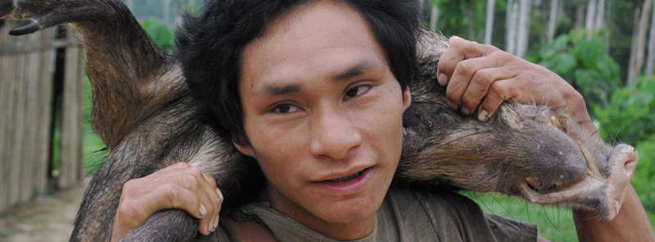
BBC & Travel Channel Show on Matsigenka tribe in Peru was staged, fabricated and distorted
02 August, 2011A TV series about the Matsigenka tribe has been slammed as “staged, false, fabricated and distorted” by experts on the tribe. Mark & Olly: Living with the Machigenga was shown on the Travel Channel in the US, and on the BBC last year. In the show Mark Anstice and Olly Steeds lived in a Matsigenka Indian village in the Amazon for several months to show the ‘reality’ of life among the tribe.
The fact that the TV show even failed to spell the tribe’s name correctly should be some indication of the quality of the programme. Normally spelt Matsigenka but with a Spanish translation of Machiguenga, the producers of this particular show went for Machigenga.
Now, two experts on the tribe have gone public with a string of highly damaging accusations. Dr. Glenn Shepard is an anthropologist who has worked with the Matsigenka Indians for 25 years and speaks their language fluently. Ron Snell, the son of US missionaries, grew up with the tribe and and is also fluent in the Matsigenkas’ tongue.
Just some of Shepard’s accusations, published in the highly-respected journal Anthropology News, are:
- In order to present a ‘false and insulting’ portrayal of the tribe as sex-obsessed, mean and savage, many of the translations of what the Indians are saying are fabricated.
- Many events presented as real in the show must have been ‘staged’.
- A key scene in the show in which Olly is subjected to painful ant stings, since “according to Matsigenka tradition he must be cleansed” and “endure the ancient punishments” for buying deer meat is denounced by Shepard as ‘fabricated and [with] no basis in ethnography.’
Ron Snell, in an article on his blog, accused the film-makers of ‘paying the Machiguengas to perform for them, saying things the Machiguengas wouldn’t ordinarily say and doing things the Machiguengas wouldn’t normally do.’
After interviewing two of the Indians in the series, Snell reported, ‘Our suspicions were correct. They [Mark and Olly] entered the village on a well travelled path and only veered a few feet off the path to film themselves “hacking their way through the jungle.” They contracted someone to make new cushmas [cotton tunics] so everyone would be wearing one. They staged the whole drama about one of the guys being accepted and the other treated as a lazy outsider…
“The translator quickly became disillusioned with the whole thing, but kept going because of the money. He is ashamed and embarrassed that he had anything to do with it.”
The series was previously at the centre of a media storm when a scouting expedition for the show was accused in Peru of provoking a flu epidemic amongst isolated Indians which caused the deaths of four of them. The show was eventually filmed a short distance from this incident.
Cicada, the production company responsible for the series, has made no comment on the accusations.
Here are some examples of the mistranslations occurring in the documentary, as highlighted by Shepard:
- An Indian who surprised Mark and Olly in his garden at night and “thought they were a herd of boar” is translated as, “If you were colonists, he would have tied you up and cut off all your skin.”
- “You come from far away where lots of gringos live” is translated as, “We use arrows to kill outsiders who threaten us.”
- (After ʻsubjecting a Matsigenka man to an embarrassing interview about his sex lifeʼ), “I will have sex another day” is translated as, “I have sex every day.”
- Shepard also says, ʻThe Matsigenka are generous hosts. It is inconceivable they would subject foreign visitors to the initiation trials portrayed in the show, forcing Olly to sleep outside for laziness, making them “gather food for the tribe,” sending them to search for a lost child, insisting they take a psychoactive brew before embarking on a phony pilgrimage, abandoning them on a raft in rapids, making them compete with a third suitor for a young
bride, and otherwise testing their “manliness.”ʼ
You can read Shepard’s original article in Anthropology News at assets.survivalinternational.org/documents/619/shepard-2011-an-mark-ollyfollies.pdf
You can also read more from Shepard’s work at ethnoground.blogspot.com
Follow Sounds and Colours: Facebook / Twitter / Instagram / Mixcloud / Soundcloud / Bandcamp
Subscribe to the Sounds and Colours Newsletter for regular updates, news and competitions bringing the best of Latin American culture direct to your Inbox.

